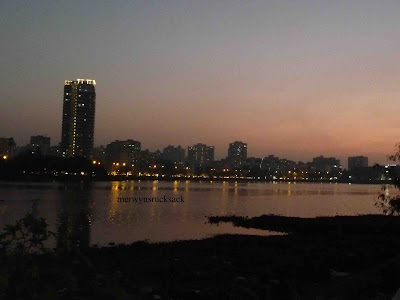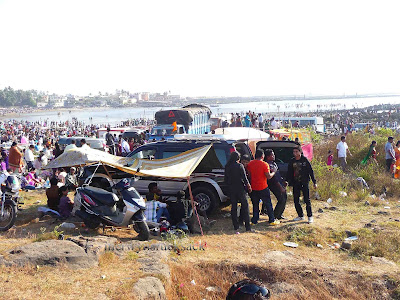Thursday, March 29, 2012
Powai Lake is located in Powai, (where else?) and rests between the Renaissance Hotel on one side and the Hiranandani Gardens on the other. The closest railways station is Andheri on the Western line and Kanjurmarg on the Central line.
I had been planning to check out this lake for a long time. Finally I had made it here. Powai Lake is within Mumbai city limits and can be easily accessed by road.
The lake is so beautiful that when you see it in front of you, you will feel that you are out of the city, never mind the traffic jammed road behind you, with the vehicle horns blaring in your ears.
 |
| View of Powai Lake |
I started to walk along the footpath cum garden which has been created around the lake so that people can enjoy the view of the lake. Most of the work is complete except for a few places along the way, but it is open to the public.
As I started my walking journey along the banks of the lake, I soon came across a machine showing the water level below and a sign warning people not to venture into the waters. I saw 13 of these installed all over the place so that people don’t venture into the lake.
There is another board there stating “Crocodiles inside the lake, do not enter the lake area.”
 |
| Another View of Powai Lake |
In conversing with a frequent visitor to this place, I learned that a crocodile had been sighted here just a few days ago with its mouth wide open. He added that the crocodiles camouflage themselves well in the surroundings, so it is advisable to always watch out for them and not take any chances whatsoever.
But as the saying goes “Curiosity killed the Cat.” Some ignorant people still venture into the lake in order to catch fish. Apparently, Guppy fish are easily available there.
Is the love to catch fish so strong that people refuse to bother about the water level and the crocodiles inside? A point to ponder upon. I would definitely not do something like this when I know the danger involved in it. But people love to take risks, as the saying goes “Not taking a Risk is the biggest Risk ever.”
 |
| Yet Another View of Powai Lake |
As I walked on the footpath I saw that the path was made of neatly cut rock stones like the ones they have on the streets of France. The feeling of walking over these stones is amazing.
I saw a few children playing on the mini merry-go-round, swings, and slides. A look of pure, unmitigated joy was evident on their faces. They were thoroughly enjoying themselves. When I was a kid, I don’t recollect going to some garden to play but I used to play in my building compound with my friends and the same joy, I remember, used to be visible on my face.
There are wooden benches put up near the lake so that people can enjoy the view of the lake. I saw this place infested with couples getting cozy by the lake, followed by oldies-goldies and the health conscious who come there for their evening jog.
 |
| Crocs in the Water |
As I sat on the bench, I could see an amazing view in the water. There were a few bare and a few fully laden coconut trees standing in the water with their roots clearly visible as the water level was low and their reflection in the water made my photos even more realistic. The waves created on the waters lashing on the thick flora growing close to the lake and the flora swaying with the impact made an amazing view.
The reflection of the Renaissance Hotel painted white in the water and the tall skyscrapers in Hiranandani also presented a great sight. The view of the lake at dusk was amazing, followed by the street lights and the building lit up and the reflection of the same in the dark water was quite a sight to see.
Again I am bad at the names of flowers but saw some amazing flowers grown and pruned in the garden next to the lake.
 |
| Freestyle Dancers |
Next come the birds. I am bad at their names too; the only birds I know are crows, sparrows, pigeons and eagles. To the others I give a pass.
I saw three different kinds of birds here, I have photographed the same so if you know their names, you are welcome to enlighten me.
Visitors to the lake can usually enjoy a boating service. For a fee, you can drive a boat in the crocodile infested waters. But didn’t see many takers for the same. I saw just 2 boats in the water.
 |
| Me |
The lake is huge. There are gardens created on the side of the road near Hiranandani Gardens. The side of the lake visible from Renaissance Hotel is closed to non-hotel guests.
It was getting darker, and I saw a flock of birds flying in synchronization, forming a V shape and flying away. Maybe they were heading home as it was going to be dark soon. They were followed by another flock of birds, much smaller than the first. I guess they missed the first flight so the group was smaller.
I later entered the Powai Nisarga Udyan, which is a garden near the lake. It is enclosed but still open to the public. I caught hold of some new flowers there. There was a small hall, where some boys would regularly show up to show each other their dance moves, practice and then have a face off. As I saw them dancing “Step Up” is the movie which came to mind, it is all about dancing, face offs etc. I took their leave as I was not done with the lake.
 |
| Reflection Hiranandani in the waters of Powai |
There is a musical fountain there open to the public. There are four shows of thirty minutes each. To my bad luck, there was no show that day.
After seeing this lake from the Hiranandani Gardens end, I decided to head back home, I had missed seeing the crocodiles and the musical water show, but nevertheless the journey was fun, as I had had the chance to converse with loads of new people and learned many new things about the place.
But what impressed me the most was that one look at the lake, and you could forget about the busy road right outside, It is truly a beautiful place in which to unwind after a hard day.

































